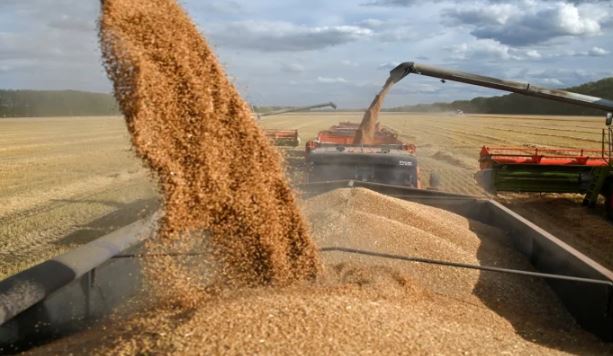Ukraine plans to ask the European Union to sanction Bangladeshi entities it says are importing wheat taken from Ukrainian territories occupied by Russia, after its warnings to Dhaka failed to stop the trade, a top Ukrainian diplomat in South Asia said.
Russian forces have occupied large parts of Ukraine`s southern agricultural regions since 2014 and Kyiv has accused Russia of stealing its grain even before the 2022 invasion. Russian officials say there is no theft of grain involved as the territories previously considered part of Ukraine are now part of Russia and will remain so forever.
According to documents provided to Reuters by people familiar with the matter, the Ukraine Embassy in New Delhi sent several letters to Bangladesh`s foreign affairs ministry this year, asking them to reject more than 150,000 tonnes of grain allegedly stolen and shipped from Russian port of Kavkaz.
Asked about the confidential diplomatic communication, Ukraine`s ambassador to India, Oleksandr Polishchuk, said Dhaka had not responded to the communication and Kyiv will now escalate the matter as its intelligence showed entities in Russia mix grain procured from occupied Ukrainian territories with Russian wheat before shipping.
"It`s a crime," Polishchuk said in an interview at Ukraine`s embassy in New Delhi.
"We will share our investigation with our European Union colleagues, and we will kindly ask them to take the appropriate measures."
Ukraine`s diplomatic tussle with Bangladeshi authorities has not been previously reported.
The Bangladesh and Russian foreign ministries did not respond to requests for comment.
A Bangladeshi food ministry official said Dhaka bars imports from Russia if the origin of the grain is from occupied Ukrainian territory, adding that the country imports no stolen wheat.
Amid the war with Russia, the agricultural sector remains one of the main sources of export earnings for Ukraine, supplying grain, vegetable oil and oilseeds to foreign markets.
In April, Ukraine detained a foreign vessel in its territorial waters, alleging it was involved in the illegal trade of stolen grain, and last year seized a foreign cargo ship and detained its captain on similar suspicions.
The EU has so far sanctioned 342 ships that are part of Russia`s so-called shadow fleet, which the bloc says enable Moscow to circumvent Western restrictions to move oil, arms and grain. Russia says Western sanctions are illegal.
Not diamonds of gold
A Ukraine official told Reuters Ukrainian law prohibits any voluntary trade between Ukrainian producers, including grain farmers in the occupied territories, and Russian entities.
The Ukraine Embassy has sent four letters to Bangladesh`s government, reviewed by Reuters, in which it shared vessel names and their registration numbers involved in the alleged trade of moving the grain from the Crimean ports of Sevastopol and Kerch, occupied by Russia since 2014, and Berdiansk, which is under Moscow`s control since 2022, to Kavkaz in Russia.
The letters stated the departure and tentative arrival dates of the ships that left from Kavkaz for Bangladesh between November 2024 and June 2025.
The 11 June letter said Bangladesh can face "serious consequences" of sanctions for taking deliveries of "stolen grain", and that such purchases fuel "humanitarian suffering."
The sanctions "may extend beyond importing companies and could also target government officials and the leadership of ministries and agencies who knowingly facilitate or tolerate such violations," the letter added.
In a statement to Reuters, Anitta Hipper, EU Spokesperson for Foreign Affairs and Security Policy, said the vessels in question were not currently subject to any restrictive measures.
The sanctions regime was designed to act against activities that undermine the food security of Ukraine including transportation of "stolen Ukrainian grain" and "any proven involvement of vessels in shipping stolen Ukrainian grain could provide the basis for future restrictive measures," she added.
The Russia-controlled territories, excluding Crimea, accounted for about 3% of the total Russian grain harvest in 2024, according to Reuters` estimates based on official Russian data. Russian grain transporter Rusagrotrans says Bangladesh was the fourth largest buyer of Russian wheat in May.
Ambassador Polishchuk told Reuters their intelligence shows Russia mixes its grain with that from occupied Ukrainian territories to avoid detection.
A Russian trader, who spoke on condition of anonymity, said that when the grain is loaded for export at a Russian port, it is very difficult to track its origin.
"These are not diamonds or gold. The composition of impurities does not allow for identification," the person said.













-20260226080139.webp)






-20260225072312.webp)








-20260219054530.webp)
-20260224075258.webp)




-20260221022827.webp)